The Intel Core Ultra 7 155H Review: Meteor Lake Marks A Fresh Start To Mobile CPUs
by Gavin Bonshor on April 11, 2024 8:30 AM ESTASUS Zenbook 14 OLED UX3405MA: Rendering & Simulation Performance
Rendering tests are often a little more simple to digest and automate than others. All the tests give out some sort of score or time, usually in an obtainable way that makes it fairly easy to extract. These tests are some of the most strenuous in our list due to the highly threaded nature of rendering and ray-tracing, and they can draw a lot of power. Power isn't so much a problem on mobile platforms, but rendering performance and how it relates to varied workloads such as video editing, is still a vital part of overall performance.
Different from rendering, in our Simulation section, these tests act more like synthetic benchmarks but, at some level, are still trying to simulate a given environment.
For this review, we have included the AMD Ryzen 9 7940HS, which includes the same Radeon 780M integrated graphics, along with the Ryzen 5 8600G, which uses the AMD Phoenix mobile architecture but is adopted for desktops. This allows us to show more data points for our review of Intel's Meteor Lake-based Core Ultra 7 155H to see where performance lies.
Despite including AMD's Phoenix-based Ryzen 8000G APUs in our results, as we expand our list of notebooks tested, we'll have more effective and comparable data points in the future. To add more reference, all of the chips have been tested with Windows 11 22H2.
Rendering
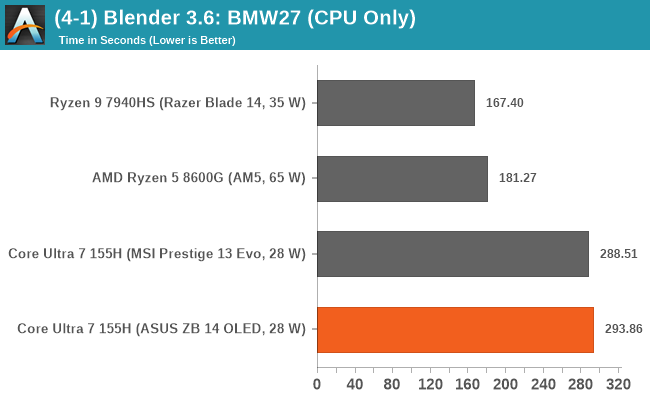
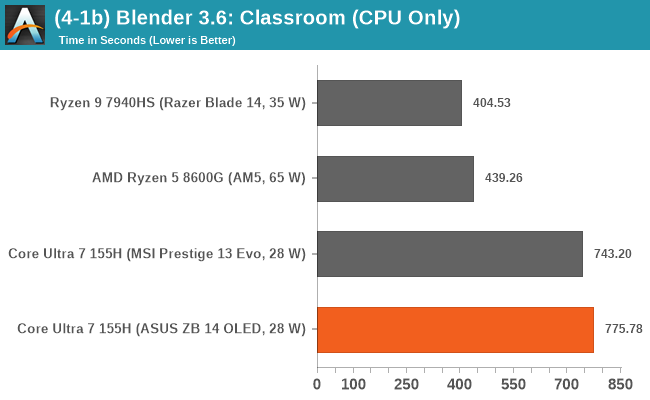
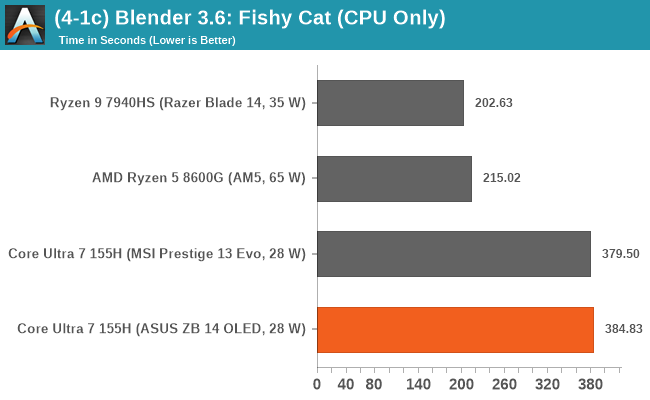
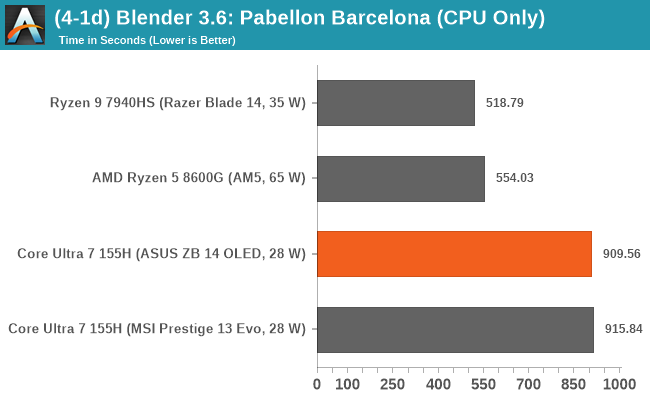
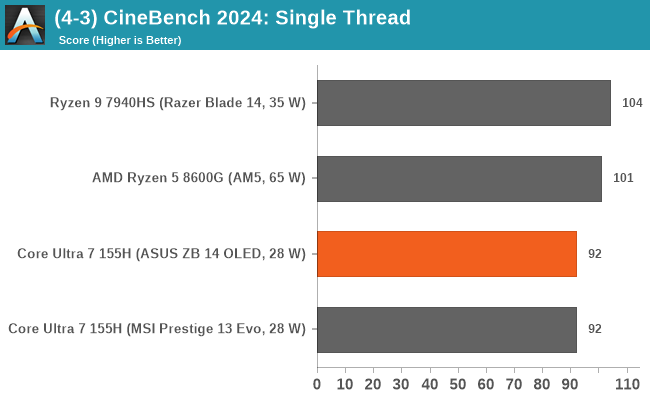
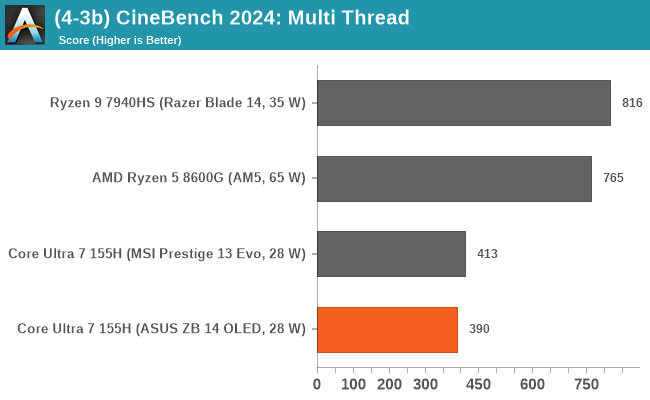
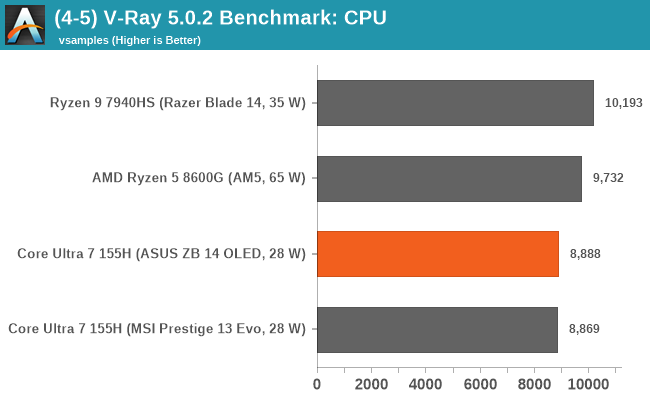
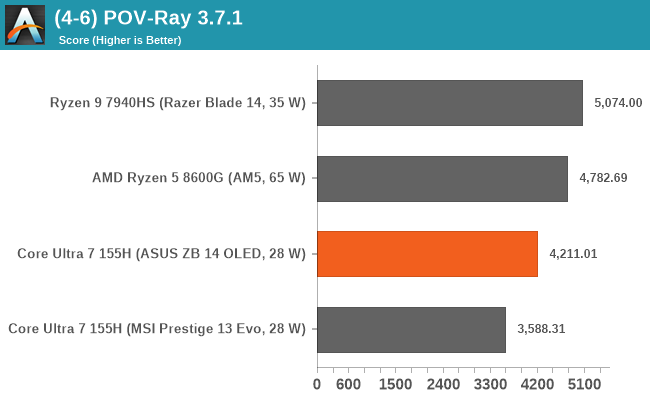
As we can see from our rendering results, the Intel Core Ultra 7 155H is quite competitive in single-threaded performance and is a little behind AMD's Zen 4 mobile Phoenix-based Ryzen 9 7940HS. The situation changes somewhat when we move to multi-threaded performance, with the Meteor Lake notebooks lagging behind in all Blender 3.6 tests. Things look better in our POV-Ray test, with a competitive showing, and there is a similar situation in the V-Ray benchmark.
Simulation
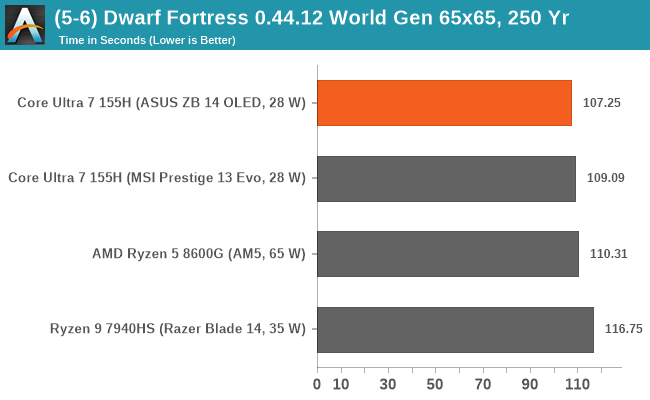
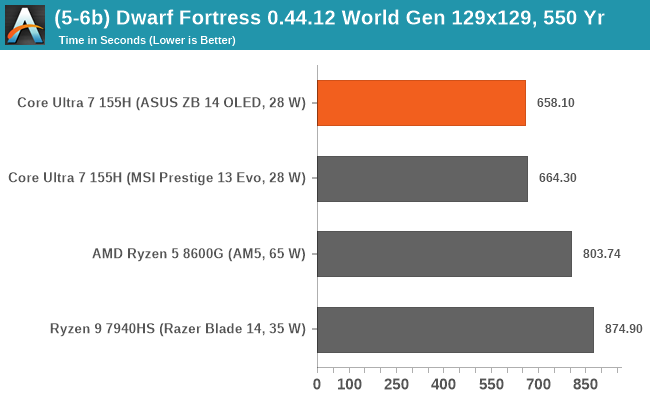
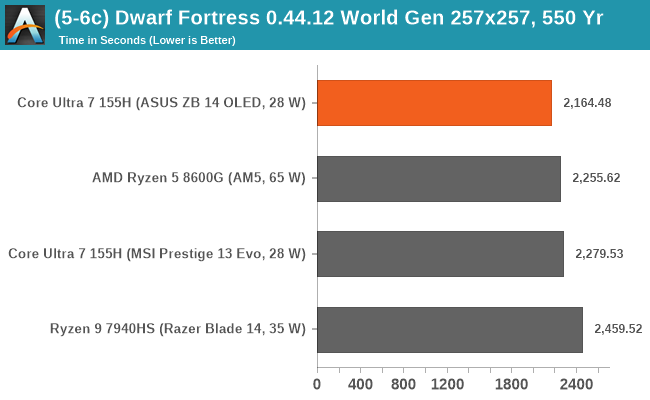
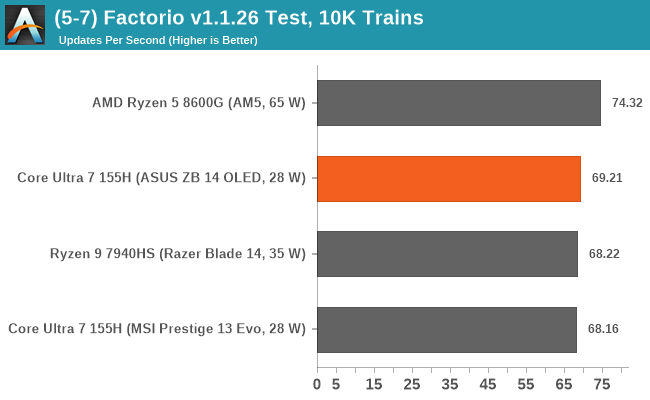
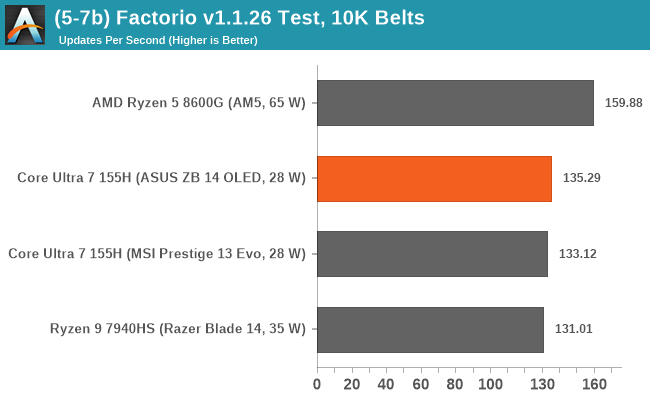
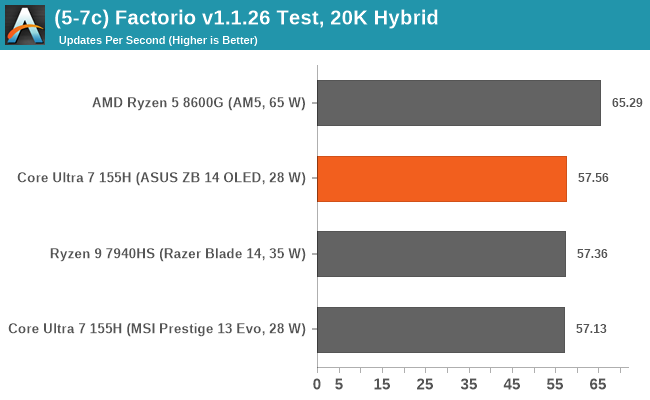
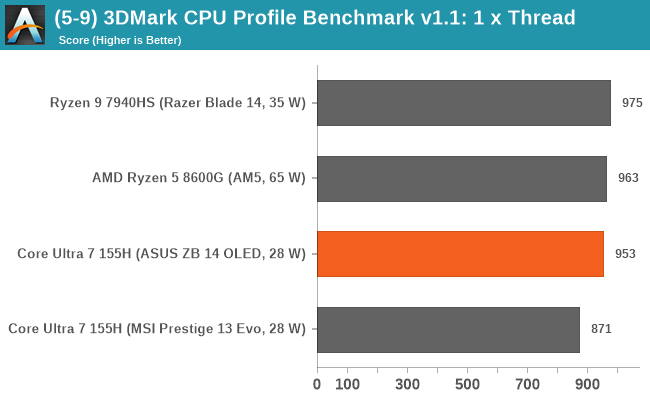
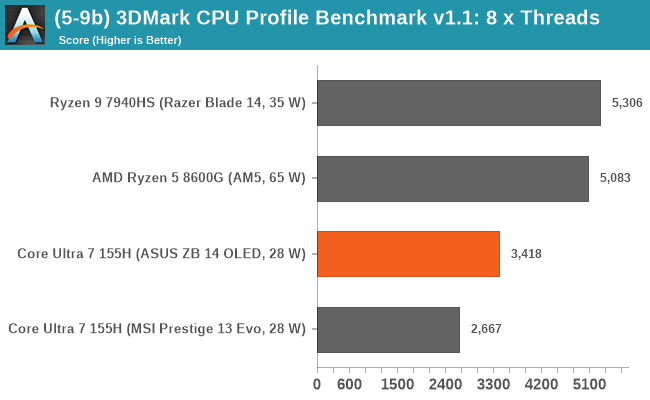
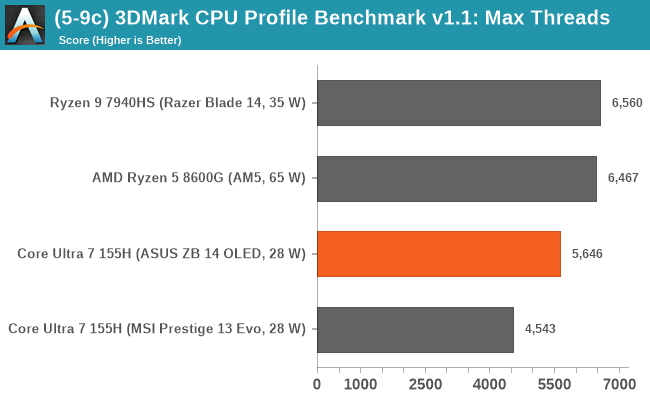
Our simulation benchmarks show that the Intel Core Ultra 7 155H outperforms the Ryzen 9 7940HS and even the desktop Ryzen 8000G series processors in Dwarf Fortress. In our Factorio tests, Meteor Lake is also very competitive with the AMD Phoenix-based chips, although the AMD chips perform better in the 3D Mark CPU profile with maximum threads.










69 Comments
View All Comments
Ryan Smith - Thursday, April 11, 2024 - link
Hmm, interesting. We're going to have to double-check with Intel on that.Ark has it down as 8 GPU cores. However the official presentation from the December "launch" had it down as 7: https://images.anandtech.com/galleries/9400/Intel%...
It's not uncommon for Intel presentations to have errors. But they also crop up in Ark from time to time as well. So 8 is probably correct, but we should get confirmation just in case. Reply
meacupla - Friday, April 12, 2024 - link
Yeah, I only noticed the difference when I had to look up why MSI claw was using a 135H. ReplyRyan Smith - Friday, April 12, 2024 - link
And Intel has since confirmed it to be 8. The article (and past articles with the bad info) have been updated. Thanks for pointing that out, meacupla! ReplyThe_Assimilator - Thursday, April 11, 2024 - link
An entire page, and an entire paragraph in the conclusion, wasted on pointless AI nonsense. Nobody reading this site cares about that rubbish, stop wasting our time. ReplyThe_Assimilator - Thursday, April 11, 2024 - link
Also good to see Intel's "revolutionary" new chip pulling the exact same BS as their past chips have regarding power. "28W" that actually uses 65W, incredible. Replymode_13h - Monday, April 15, 2024 - link
The only thing your comment tells me is that the AI benchmarks should be updated to include more typical real-world AI usage examples. Aside from things like Stable Diffusion, where most readers are likely to encounter AI in their everyday computing is in apps like video conferencing (background replacement, noise suppression) and photo editing. ReplyNextGen_Gamer - Thursday, April 11, 2024 - link
Those iGPU numbers are way off - the Socket AM5 8700G is obviously going to outperform the mobile variant across the board, based on TDP alone. Even if the mobile version was using LPDDR5X memory (which in this case it wasn't), it wouldn't be enough to close the gap.AnandTech: ever given any though to getting all these chips in mini PC form? Most of those allow much more control over the TDP, along with memory/SSD being your own picks. And then that all but eliminates the cooling issues of a laptop. Reply
meacupla - Thursday, April 11, 2024 - link
While you can get a 7940HS miniPC now, Core Ultra miniPCs aren't out yet.Core Ultra laptops are showing up at reviewers just now, but they've barely left the gate in terms of availability to regular consumers.
Asus announced NUC 14 two weeks ago, on Mar 27. They are just now being listed at various retailers, so I would expect them to show up in stock a month or two from now. Reply
ricebunny - Friday, April 12, 2024 - link
My retailer indicates that the Asus Nuc 14Pro+ is available. I would be curious to see how the 155H performs in that chassis with a lot more thermal headroom. Replyhaplo602 - Thursday, April 11, 2024 - link
"On the flip side, as we established with our look at power consumption, the Ryzen 9 7940HS laptop is able to sustain a much higher TDP overall – so that memory bandwidth deficit is counterbalanced by a sizable TDP advantage."Are you really a tech review site ? In this case memory bandwidth is king with TDP a distant second (given comparable compute power). And Intel has a huge advantage with LPDDR5X here that it manages to waste somehow.
Also the official title is CPU review and there are graphs for BATTERY CHARGE TIME ??? Really ? What does that have to do with the CPU at all ? Reply